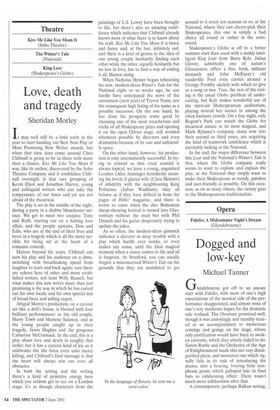Theatre
Kiss Me Like You Mean It (Soho Theatre)
The Winter's Tale (National)
King Lear (Shakespeare's Globe)
Love, death and tragedy
Sheridan Morley
It may well still be a little early in the year to start handing out Best New Play or Most Promising New Writer awards, but when that time does come around Chris Chibnall is going to be in there with more than a chance. Kiss Me Like You Mean It was, like its author, discovered by the Soho Theatre Company and it establishes Chibnall overnight in that rare grouping of Kevin Elyot and Jonathan Harvey, young and colloquial writers who can take the temperature of our times and yet are not afraid of the theatrical.
The play is set in the middle of the night, during a party in a shabby Manchester terrace. We get to meet two couples: Tony and Ruth, starting out on a halting love affair, and the people upstairs, Don and Edie, who are at the end of their lives and loves in a tragedy which is all the more terrible for being set at the heart of a romantic comedy.
Mature beyond his years, Chibnall can turn his play and his audience on a dime, switching with breathtaking speed from laughter to tears and back again: sure there are echoes here of other and more established writers, not least Willy Russell, but what makes this new writer more than just promising is the way in which he has carved out his own locale and his own special mix of broad farce and aching regret.
Abigail Morris's production, on a cut-out set like a doll's house, is blessed with four brilliant performances: as the old couple, Harry Towb and Marlene Sidaway, and as the young people caught up in their tragedy, Jason Hughes and the gorgeous Catherine McCormack. In the end, this is a play about love and death in roughly that order: but it has a curious kind of joy as it celebrates the life force even unto mercy killing, and Chibnall's final message is that the heart will always win out over all obstacles.
In both the setting and the writing there's a kind of primitive energy here which you seldom get to see on a London stage: it's as though characters from the paintings of L.S. Lowry have been brought to life, but there's also an amazing confidence which indicates that Chibnall already knows most of what there is to know about his craft. Kiss Me Like You Mean It is brave and funny and, at the last, infinitely sad: and there is a kind of genius in the idea of one young couple hesitantly finding each other while the other, equally hesitantly but no less in love, has to find a way of ending it all. Hasten along.
When Nicholas Hytner began rehearsing his new, modern-dress Winter's Tale for the National eight or so weeks ago, he can hardly have anticipated the news of the retirement (next year) of Trevor Nunn, nor the consequent high listing of his name as a possible successor. On the one hand, he has done his prospects some good by choosing one of the most treacherous and tricky of all Shakespeare plays and opening it on the open Olivier stage, still avoided whenever possible by directors and even dramatists because of its vast and unfriendly space.
On the other hand, however, his production is only intermittently successful. In trying to remind us that royal scandal is always topical, we have a young, anguished Leontes (Alex Jennings) mistakenly accusing his lovely if glacial wife (Clare Skinner) of infidelity with the neighbouring King Polixenes (Julian Wadham); they all behave as if they have drifted in from the pages of Hello! magazine, and there is worse to come when the dire Bohemian sheep-shearing festival is turned into Glastonbury without the mud but with Phil Daniels and his guitar desperately trying to update the jokes.
As so often, the modern-dress gimmick indicates a director in deep trouble with a play which hardly ever works, or even makes any sense, until the final magical moment when a statue comes to life and all is forgiven. At Stratford, you can usually forgive a misconceived Winter's Tale on the grounds that they are mandated to get around to it every ten seasons or so; at the National, where they can cherry-pick their Shakespeares, this one is simply a bad choice all round or rather in the semiround.
Shakespeare's Globe is off to a better summer start than usual with a darkly intelligent King Lear from Barry Kyle. Julian Glover, admittedly one of nature's Gloucesters, offers a fine, brisk, militant monarch and John McEnety's old vaudeville Fool even carries around a George Formby ukelele with which to give us a song or two. True, the rest of the casting is the usual Globe problem of undercasting, but Kyle makes wonderful use of the open-air Shakespearean auditorium, playing several key scenes in among the often footsore crowds. On a fine night, only Regent's Park can match the Globe for theatrical nature at its most magical, and Mark Rylance's company, many now into their second or third years, are acquiring the kind of teamwork confidence which is inevitably lacking at the National.
In the end, the major difference between this Lear and the National's Winter's Tale is that, where the Globe company really seems to want to explore and explain the play, at the National they simply want to make their Shakespeare as trendy, painless and user-friendly as possible. On this occasion, as on so many others, the victory goes to the Shakespearean traditionalists.










































































 Previous page
Previous page